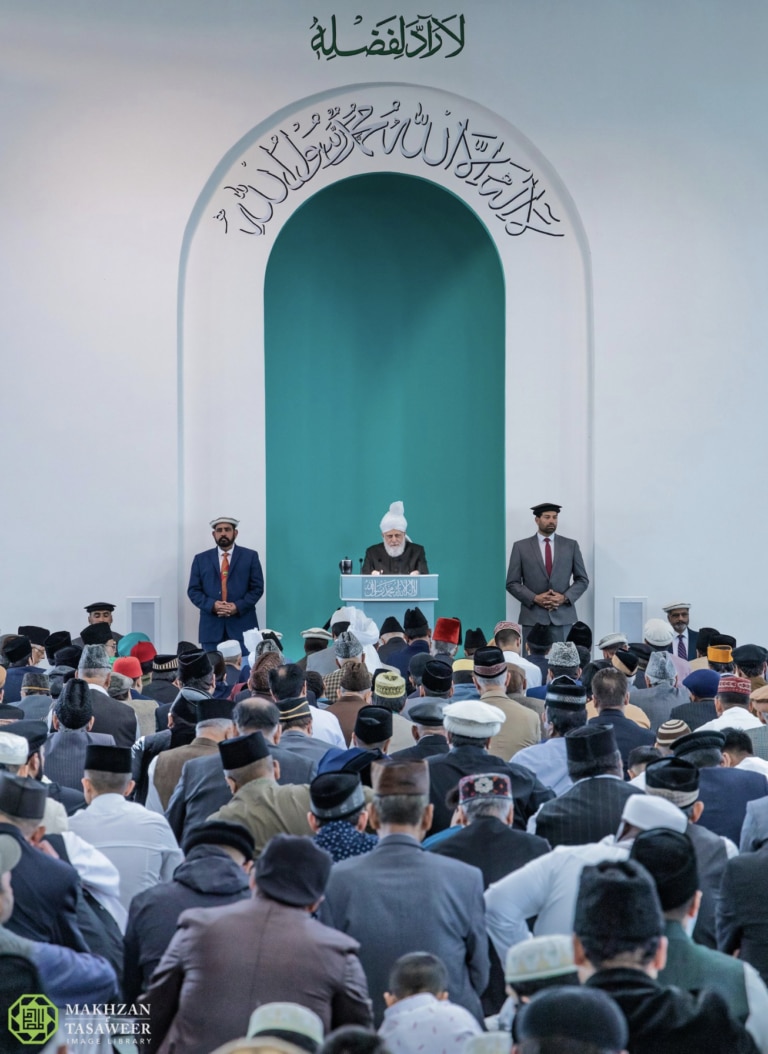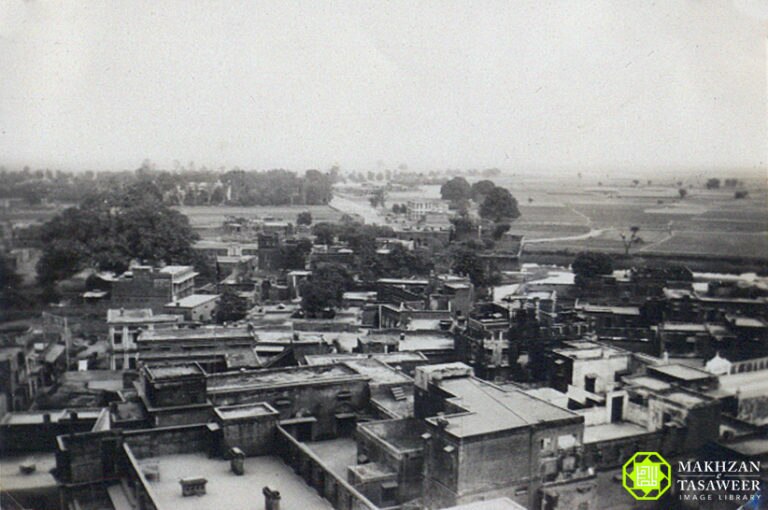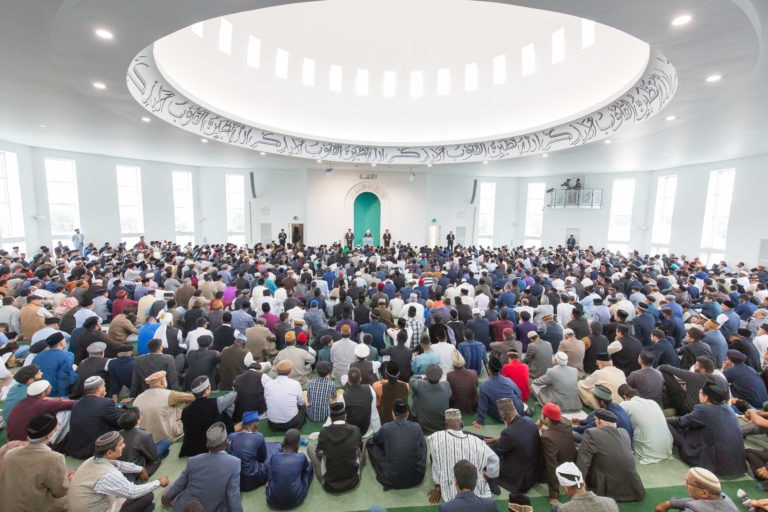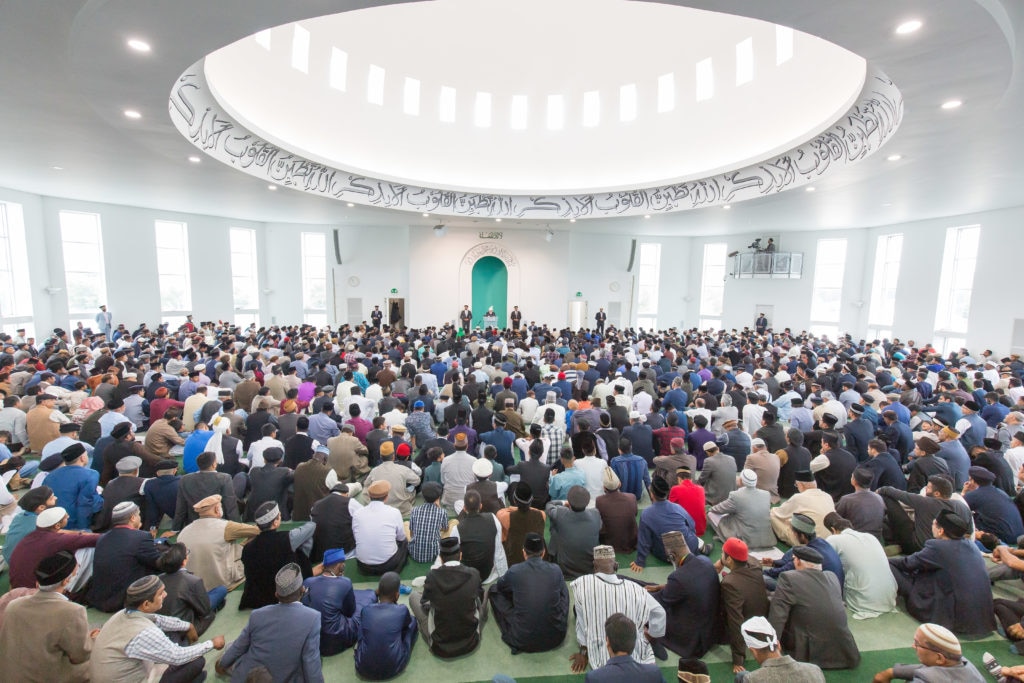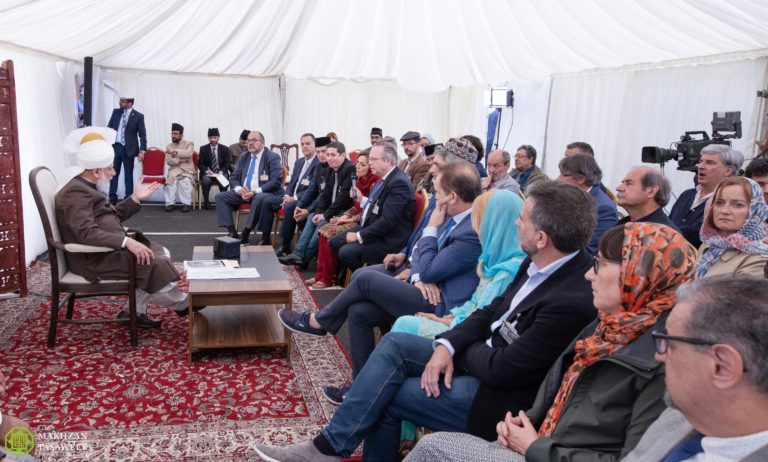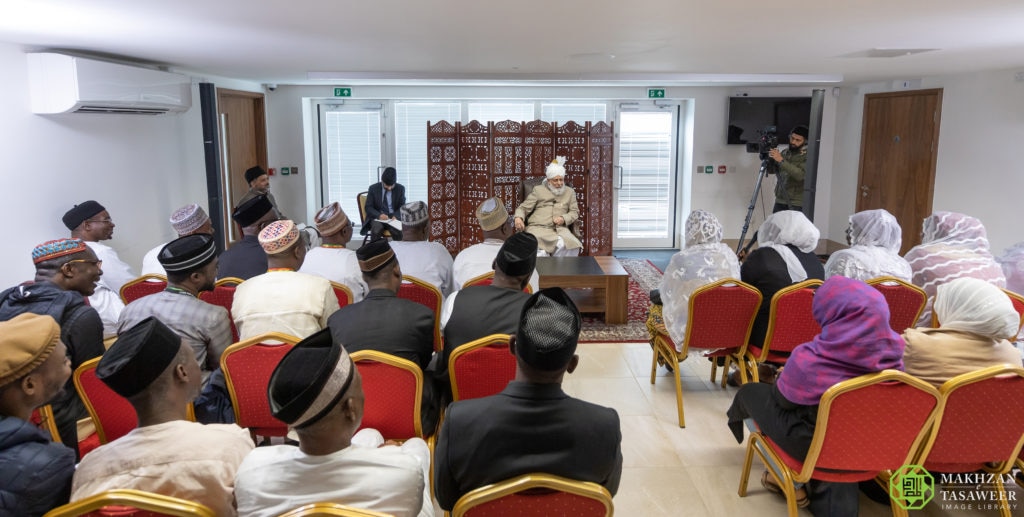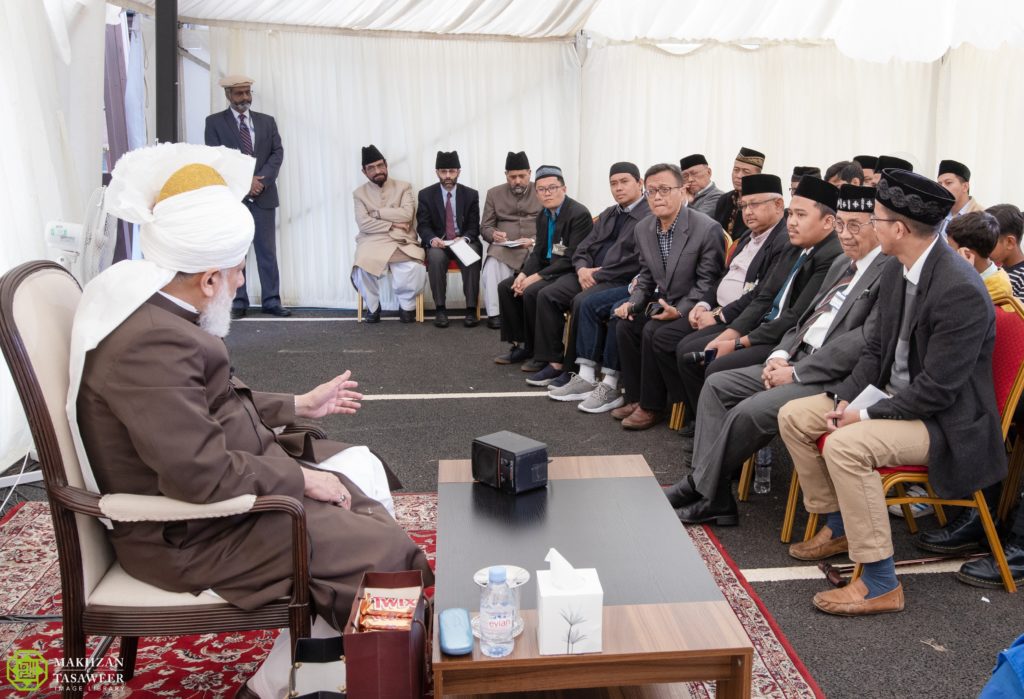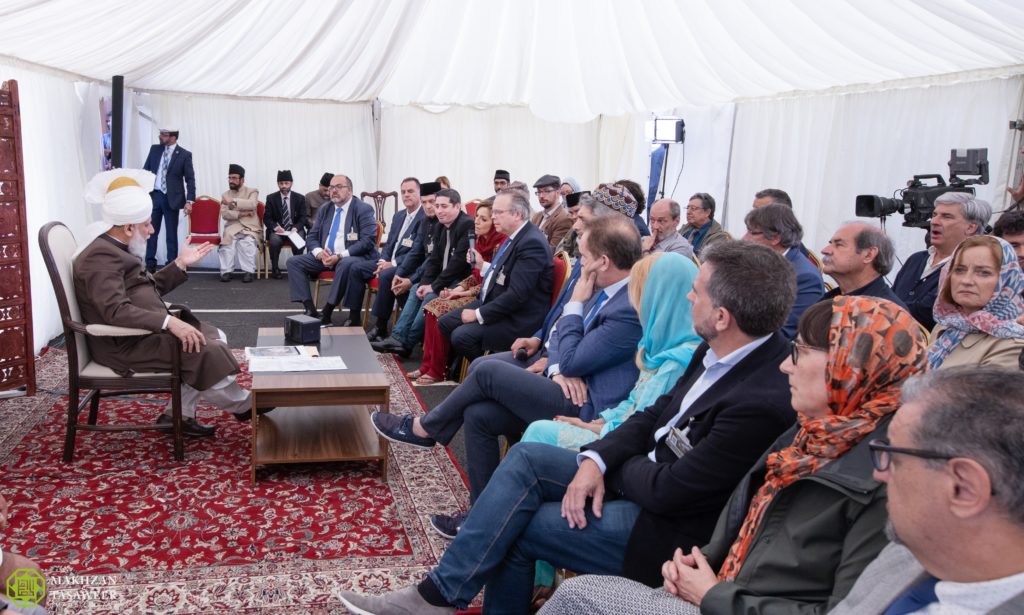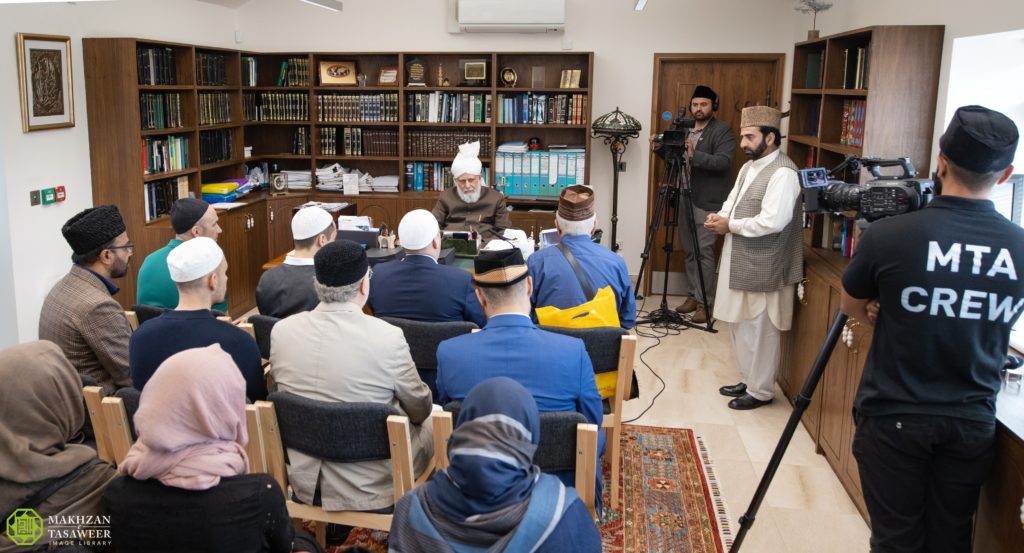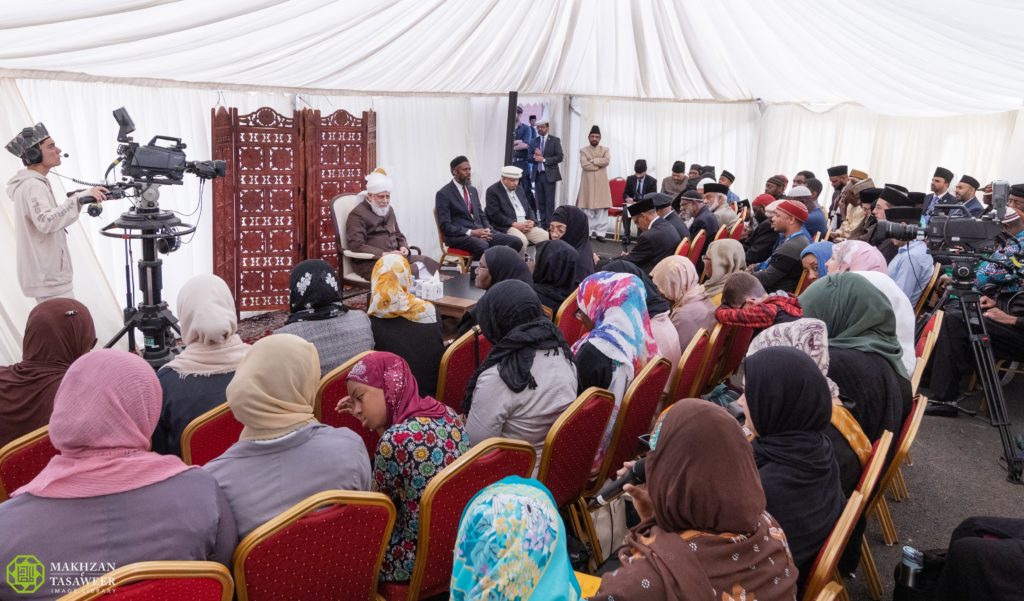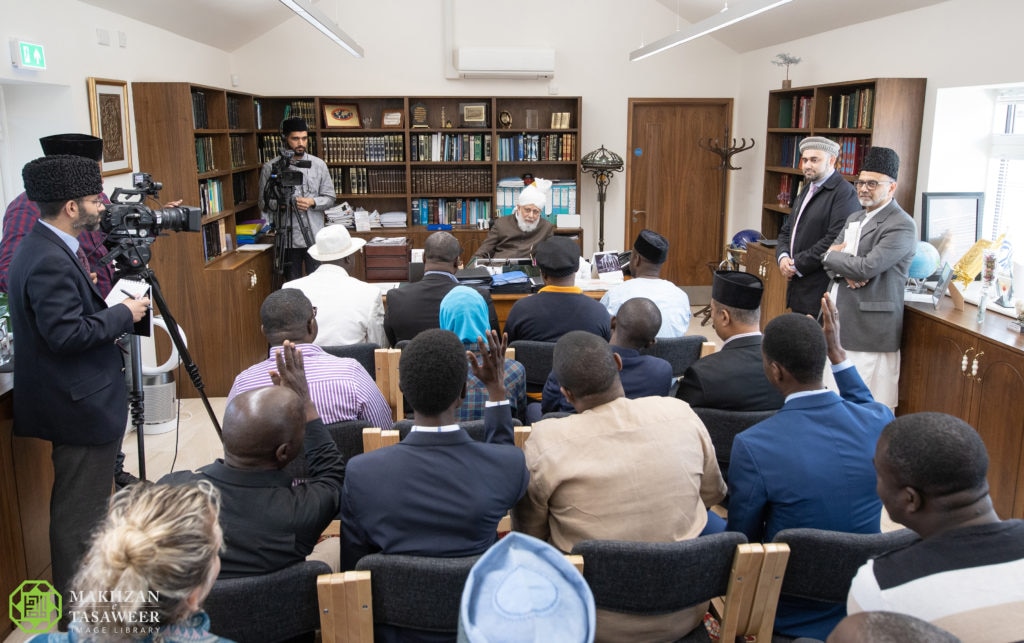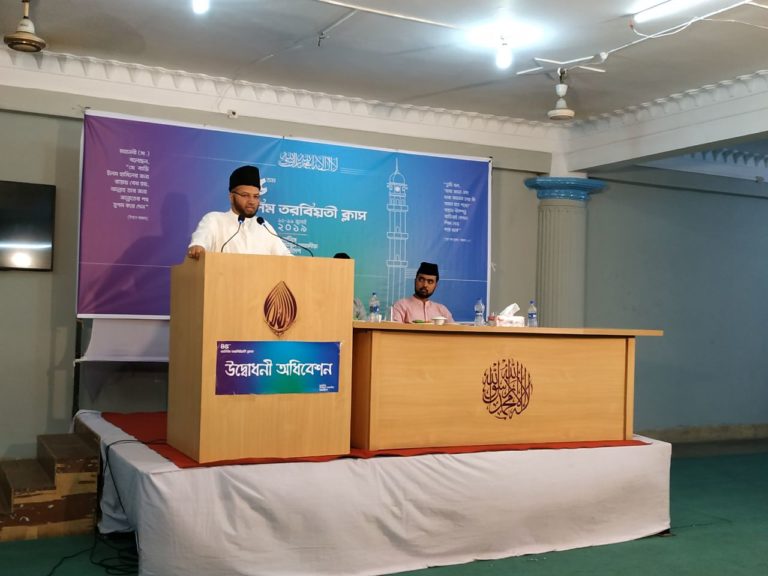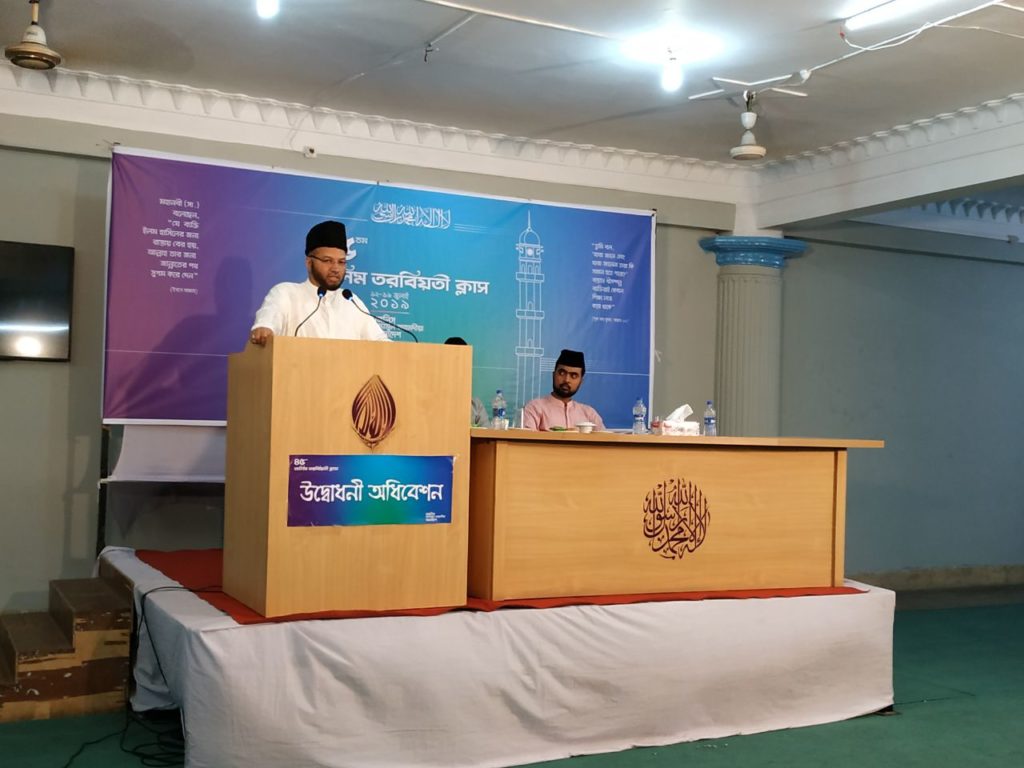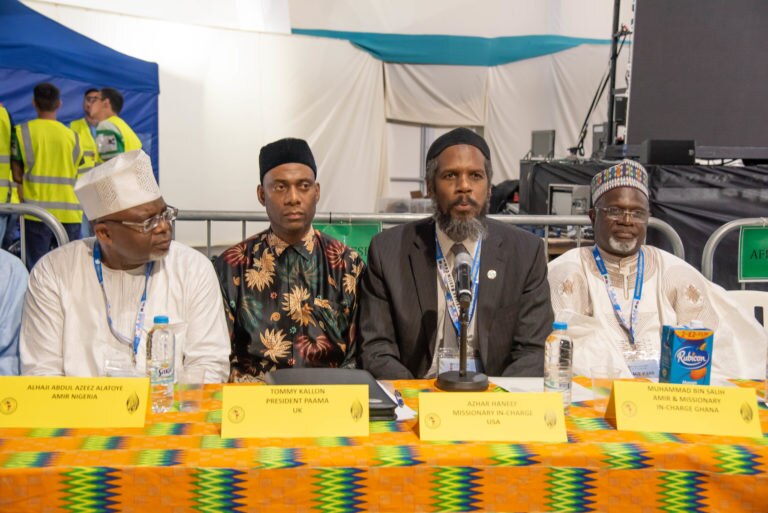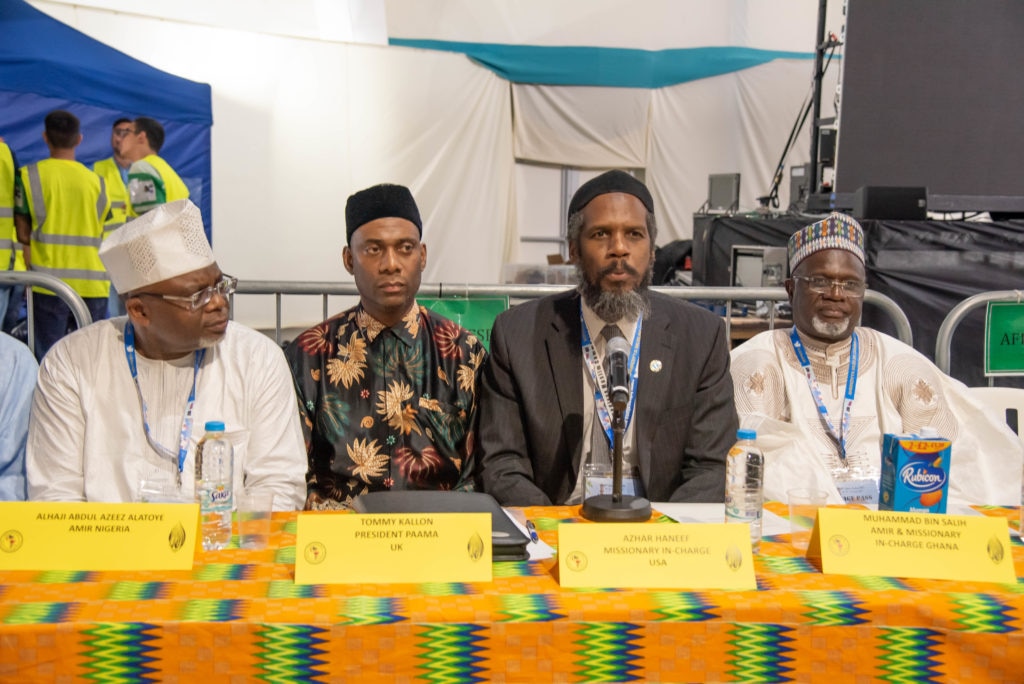Friday Sermon
26 July 2019
Men of Excellence
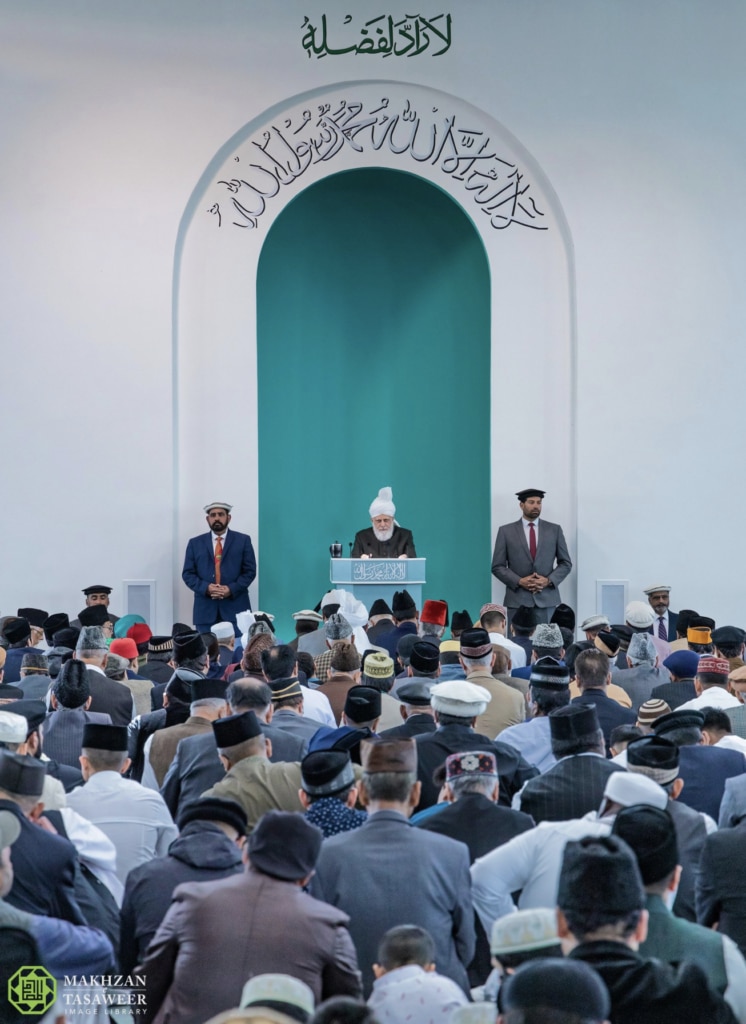
After reciting the Tashahud, Ta‘awuz, and Surah al-Fatihah, Hazrat Khalifatul Masih Vaa stated:
Today, I shall continue to relate accounts of the Badri companions’ lives [those companions who took part in the Battle of Badr].
The first companion to be mentioned is Hazrat Muzahirra bin Rafay. The name of Hazrat Muzahir’s father was Rafay bin Adi. Hazrat Muzahirra belonged to the Banu Harithah bin Harith clan of the Aus tribe of the Ansar. Hazrat Muzahirra and Hazrat Zuhairra were brothers and both of them were paternal uncles of Hazrat Rafayra bin Khudaij. (Al-Sirat al-Nabawiyyah li Ibn Hisham, p. 324 footnote, Dar-ul-Kutub al-Ilmiyyah, Beirut, 2001)
Hazrat Rafayra bin Khudaij is being mentioned because, although he was not a Badricompanion, but nevertheless, he holds great importance in history. Hazrat Muzahirra was his uncle, and so Rafay was his nephew’s name as well as his father’s.
I shall briefly mention about Hazrat Rafayra that he was the companion who presented himself for participation in the Battle of Badr, but the Holy Prophetsa sent him back due to his young age. He later permitted him to participate in the Battle of Uhud. Hazrat Rafayra participated in the battles of Uhud, the Ditch and the rest of the battles. His collarbone was struck by an arrow on the day of Uhud and although the arrow was removed but a piece of the arrowhead remained in his body until his demise.
The Holy Prophetsa once said to Hazrat Rafayra, “I will bear witness in your favour on the Day of Judgment.” Hazrat Rafayra passed away during the reign of Abdul Malik bin Marwan in 74 AH at the age of 86.
(Usdul Ghaba Fi Marifat Al-Sahaba Li Ibn Athir, Vol. 2, p. 232-233, Rafay bin Khudaijra, Dar-ul-Kutub al-Ilmiyyah, Beirut, 2008)
In any case, these were some details in reference to his nephew. However, I will now continue to relate the account of Hazrat Zuhairra.
Imam Bukharirh has mentioned that Hazrat Zuhairra participated in the Battle of Badr along with his brother. He has not recorded the name of that brother, however, the commentators of Bukhari have written that the brother’s name was Muzahir. Similarly, regarding Hazrat Zuhairra bin Rafay, it is written in Subul al-Huda War-Rashaad, a book on the biography of the Holy Prophetsa, that according to Bukhari, his brother, Hazrat Muzahirra, also participated in the Battle of Badr.
Earlier, I stated the name of Hazrat Zuhairra, however I am relating the account of Hazrat Muzahirra.
In the books on the biographies of the companions, such as Usdul Ghaba, al-Isabah and al-Isti‘ab etc. there is no mention of Hazrat Muzahir’s participation in the Battle of Badr. With regard to Hazrat Muzahirra, it is written in these three books that Hazrat Muzahirra participated in the Battle of Uhad and in all the subsequent battles alongside the Holy Prophetsa. Hazrat Muzahirra passed away during the Khilafat of Hazrat Umarra. (Sahih al-Bukhari, Kitabul Maghazi) (Irshad As-Sari Li Sharhi Sahih al-Bukhari, Vol 7, p 195, Darul Fikr, Beirut, 2010) (Subulal Huda War Rashaad, Vol 4, p.106, Ghazwah Badrul Kubra, Dar-ul-Kutub al-Ilmiyyah, Beirut, 1993) (Usdul Ghaba, Vol. 5, p. 185, Muzahir bin Raafi, Dar-ul-Kutub al-Ilmiyyah, Beirut, 2003) (Al-Isaba Fi Tamyeez Al-Sahaba, Vol. 6, p. 106, Muzahir bin Raafi, Dar-ul-Kutub al-Ilmiyyah, Beirut, 1995) (Al-Isti‘ab Fi Ma’rifatil Ashaab, Vol. 4, p. 39, Muzahir bin Raafi, Dar-ul-Jeel, Beirut, 2002)
However, the sources that prove that Hazrat Muzahirra participated in the Battle of Badr are considered more reliable.
Yahya bin Sahl bin Abu Hathmah narrates that Hazrat Muzahirra bin Rafay Harithi brought some strong workmen along with him from the region of Levant so that they may work on his land. When he arrived at Khaybar, he stayed there for three days. There, the Jews started to instigate those labourers to murder Hazrat Muzahirra and also secretly gave them a few knives. When Hazrat Muzahirra came out of Khaibar and arrived at a place called Sibaar, which is situated six miles away from Khaibar, these men attacked Hazrat Muzahirra, piercing his abdomen as a result of which he was martyred.
Following this, these individuals returned to Khaybar upon which the Jews gave them provisions for their journey as well as food and set them off until they returned and reached Levant again. When Hazrat Umarra bin al-Khattab was informed of this news, he said that he would set out towards Khaybar, distribute the wealth that was found there and clearly mark the boundaries in the land. That is, revenge would be sought. He also declared that he would exile the Jews from there as the Holy Prophetsa had said in relation to them that he would grant them protection until God Almighty had granted them protection. Now, God Almighty had granted permission to exile them. Hence, Hazrat Umarra exiled them.
(Kanzul Ummal, Vol. 4, p. 509, Ikhraajul Yahood, Hadith 11505, Mu’assisah al-Risalah, Beirut) (Al-Isti‘ab, Vol. 4, pp. 39-40, Muzahir bin Raafi, Dar-ul-Kutub al-Ilmiyyah, Beirut, 2002) (Mu‘jamul Buldan, Vol. 2, p. 6, Dar Ihyaa al-Turath al-Arabi, Beirut)
The incident of the martyrdom of Hazrat Muzahirra occurred in 20 AH. (Al Kamil Fi Al Tarikh li Abi Hasan bin Ali, Vol 2, p.410, Dar-ul-Kutub al-Ilmiyyah, Beirut, 2002)
Then, the next companion to be mentioned is Hazrat Malikra bin Qudamah. Hazrat Malikra bin Qudamah’s father was Qudamah bin Arfajah, and according to one narration, the name of his paternal grandfather has been mentioned as Harith. That is, he was referred to as Harith instead of Arfajah. Hazrat Malik belonged to the clan of Banu Ghanam of the Ansar tribe of Aus. Hazrat Malikra participated in the Battle of Badr along with one of his brothers, Hazrat Munzirra bin Qudamah. Hazrat Malikra also participated in the battle of Uhud.
(Al-Sirat al-Nabawiyyah li Ibn Hisham, p. 466, Dar-ul-Kutub al-Ilmiyyah, Beirut, 2001) (Al-Tabaqaat-ul-Kubra li ibn Sa‘d, Vol. 3, p. 367, Dar-ul-Kutub al-Ilmiyyah, Lebanon, 1990)
The next companion to be mentioned is Khuraimra bin Fatik. Hazrat Khuraimra bin Fatik belonged to the Banu Asad. His father’s name was Fatik bin Akhram and his name has also been recorded as Akhram bin Shaddad. Hazrat Khuraim’s title was Abu Yahya, whereas according to another narration, it has been mentioned as Abu Ayman because the name of his son was Hazrat Ayman bin Khuraim. Hazrat Khuraimra bin Fatik participated in the Battle of Badr along with his brother, Hazrat Sabrahra bin Fatik.
(Al-Tabaqaat-ul-Kubra li ibn Sa‘d, Vol. 2, p. 167, Khuraim bin Faatik, Dar-ul-Kutub al-Ilmiyyah, Beirut, 2008)
According to a narration, Hazrat Khuraimra also participated in the Treaty of Hudaybiyyah. A lesser known narration also states that Hazrat Khuraimra and his son, Hazrat Aymanra, accepted Islam following the Conquest of Mecca along with the tribe of Banu Asad. However, the first narration is more authentic in that Hazrat Khuraimra participated in the Battle of Badr. Furthermore, Imam Bukharirh mentioned him as a Badri companion [who participated in the battle of Badr] in his book, Al-Tareekh-ul-Kabeer.
Hazrat Khuraimra and his son later went to Kufa and according to one narration, both of them moved to the city of Raqqa, which is a well-known city located to the north of the Euphrates River. Both of them passed away there during the rule of Hazrat Amir Muawiyahra.
(Al-Isaba Fi Tamyeez Al-Sahaba, Vol. 2, p. 236, Khuraim bin Faatik, Dar-ul-Fikr, Beirut, 2001) (Al-Tarikh Al Kabir, Abdullah Muhammad bin Ismael Bukhari, Vol 3, p.196, Dar-ul-Kutub al-Ilmiyyah, Beirut, 1995) (Mu‘jamul Buldan, Vol. 4, pp. 413-414)
Hazrat Khuraimra bin Fatik narrates his incident of accepting Islam in the following manner: “I went in search of my lost camels and while seeking their trail, night had fallen. Eventually, I found them at Abraq-ul-Azaha‘f, which is the name of the famous well belonging to the Banu Asad bin Khazima, which is situated on the way from Medina to Basra. I found the camels there, tied them up at the very same place and took some rest, leaning against the leg of one of the camels.”
In other words, he sat there to spend the night. He further says: “This took place towards the early period of the Holy Prophet’s migration. I said in a loud voice that I seek the protection of the chief of this valley.”
This was their custom at that time. Hazrat Khuraimra says that during the period of ignorance [i.e. prior to the advent of Islam], this was a customary practice of the people. During the period of ignorance, when a person entered a barren valley in order to spend the night, he would utter these words in order to remain protected from the evil of its inhabitants and the foolish people. Nevertheless, he says: “All of a sudden, an individual called me whilst I was uttering these words and he said the following couplets:
‘May God have mercy on you. You should seek the protection of Allah, the Magnificent, Who sends down all that which has been made unlawful and lawful.
Affirm the Oneness of God, and you will have no concerns about the trials from Jinns. Remembrance of Allah Almighty will grant your protection from the Jinns in the surrounding lands and mountains for many miles. Their plots will become unsuccessful, and nothing will remain except for the righteous person and virtuous deeds.’”
This means that only good deeds would continue and no evil would remain.
Hazrat Khuraimra further narrates: “I responded, ‘O you who has proclaimed this! Do you consider this as the truth or are you merely seeking to misguide me?’” (The concept of the unity of God seemed strange to him because beliefs during the days of ignorance were contrary to this. “However, he replied, ‘He is the Messengersa of Allah! He is a bearer of glad-tidings, who brought Yasin and Hameemaat and other detailed chapters [of the Holy Quran] which explain everything. He has clearly distinguished what is forbidden and what is lawful. He commands us to offer prayer and observe fast. He forbids people from committing evil deeds, the evil which was witnessed amongst the people before us.’”
This was the response he gave as regards how they learnt about the message of the unity of God. Hazrat Khuraimra further narrates:
“I replied, ‘May Allah have mercy on you! Who are you?’ He replied, ‘I am Malak bin Malik. The Messengersa of Allah sent me to watch over the Jinn of the people of Najjad, (i.e. the chiefs of the people of Najjad).’” (This was the conversation that took place between the two). Hazrat Khuraimra stated, “If there was someone who would look after my camels for me then I would surely visit this Prophet and indeed accept him.”
He liked what he heard about the message regarding the unity of God. Malak bin Malik replied, “I will take the responsibility of looking after your camels and will ensure they reach your family safely.” Hazrat Khuraimra states:
“I prepared one of my camels and rode it to Medina and entrusted the rest to him. I arrived at the time of Jumuah [Friday Prayers], and everyone was engaged in offering prayers, so I decided it was better to go inside after they had completed their prayer. Since I was also tired, I therefore sat down and also rested my camel. Abu Dharra came outside and informed me that the Holy Prophetsa had instructed me to come inside, and so I went inside.
“When the Messengersa of Allah saw me, he stated, ‘What happened to the elderly man who had guaranteed the safe delivery of your camels to your house? Has he delivered your camels safely to your house.’”
Thus, Allah the Almighty had shown a vision to the Holy Prophetsa and had informed him about the entire incident. Hazrat Khuraimra further states:
“When I heard this, I stated, ‘May Allah have mercy on him.’ The Prophet of Allahsa replied, ‘Indeed, may Allah have mercy on him.’” Hazrat Khuraimra states, “I responded to this by proclaiming, ‘I bear witness that there is none worthy of worship except Allah.’” Thus, this was the beautiful manner in which he accepted Islam.
(Al-Mu‘jam Al-Kabir, Hafiz Abul Qasim bin Ahmad Tibrani, Vol 4, pp.211-213, Hadith No. 4166, Maktaba Ibn Taymiyyah, Cairo) (Al-Sirat al-Nabawiyyah li Ibn Hisham, Vol 1, p. 379, Dar-ul-Ma’rifah, Beirut, 1976) (Mu‘jamul Buldan, Vol. 1, p. 68, Dar Ihyaa al-Turath al-Arabi, Beirut) (Bulugh Al-Rabb, Dr Pir Muhammad Hasan, Vol 3, p. 135, Urdu Science Board, Lahore, 2002)
Hazrat Khuraimra himself has related this account of his acceptance of Islam. Hazrat Khuraimra bin Fatik had a very graceful personality and very meticulous nature. He was always well-dressed and well maintained.
(Seeratus Sahabah, Vol 7, p. 307, Dar-ul-Ishaat, Karachi)
Prior to accepting Islam, he would wear an extra-long lower garment and kept long hair. There is a hadith recorded about this in Mustadrak Al-Hakim. Hazrat Khuraimra bin Fatik narrates that once the Holy Prophetsa arrived and stated, “O Khuraim! You would have been an excellent person if you did not possess these two traits.” Upon this Hazrat Khuraimra submitted, “O Messengersa of Allah! May my mother and father be sacrificed for your sake. What are those two traits?” The Holy Prophetsa replied, “Your long hair and allowing your lower garment to drag.” This referred to wearing extra-long lower garment, which was considered a sign of arrogance in those days. Hence, Hazrat Khuraimra went and had his hair cut and shortened his lower garment.
(Al-Mustadrak Ala Al-Sahihain, Vol. 6, p. 2363, Kitab Marifatu Al-Sahaba, Hadith No. 6608, Maktabah Nazzaar Mustafah, Mecca, 2000)
There is another narration in Tarikh-ul-Kabir by Hazrat ibn Hanzaliyyah that the Holy Prophetsa said, “How wonderful a man would Khuraim Asadi be if he did not let his hair grow to his shoulders or allow his lower garments to drag on the floor” i.e. not wear the izar or lower part of his clothes so long, out of pride. When Hazrat Khuraimra came to know about this he took a short blade and cut his hair to the height of his ears, rather than keeping the long hair he had. Furthermore, he cut the lower garments up to the middle of his calves. (Al-Tarikh Al Kabir, Abdullah Muhammad bin Ismael Bukhari, Vol 3, p.196, Dar-ul-Kutub al-Ilmiyyah, Beirut, 2001)
This is because wearing a long lower garment was perceived as a sign of arrogance in those days.
Therefore, this is a response for those men who are of the opinion that there is no harm in keeping long hair, without reason or cause.
One should keep the length of their hair to the length which the Holy Prophetsa has stated i.e. to the earlobes; it should not be long like the hair of women. Hazrat Khuraimra also participated in the conquests of Syria in the time of Hazrat Umarra.
(Seeratus Sahabah, Vol 7, p. 307, Dar-ul-Ishaat, Karachi)
Hazrat Qaisra bin Abu Hazim and Hazrat Aamirra Sha‘bi relate that Marwan bin Hakam asked Hazrat Aiman bin Khuraimra, “Why do you not join us in battle?” He replied, “My father and my uncles participated in the Battle of Badr and they strongly admonished me not to fight against anyone who declares that there is no God but Allah.”
Hazrat Aimanra then said to Marwan bin Hakam, “If you have brought me a guarantee of safeguarding against the hell-fire then I shall join you in battle.” Upon this, Marwan told him to leave. So he went forth reciting the couplets, “I shall not fight another [Muslim] simply because he praises another leader from among the Quraish. For him is his rule and for me is my own sin. I seek refuge with Allah from such ignorance and animosity. How can I kill an innocent Muslim? If I had done so then it would be of no avail to me, no matter how long I live.”
(Al-Mustadrak Ala Al-Sahihain, Vol. 3, p. 1004, Kitab Marifatu Al-Sahaba, Zikru Khuraim bin Faatik, Hadith No. 2667, Maktabah Nazzaar Mustafah, Mecca, 2000)
If we look at the actions of the Muslims nowadays, we will see just how far they have drifted away from the true teachings of Islam.
The next Companion I shall mention is Hazrat Ma‘marra bin Harith. Hazrat Ma‘marra bin Harith belongs to the Banu Jumuah tribe of the Quraish. His father was Harith bin Ma‘mar and his mother was Qutailah bint Maz‘un, who was the sister of Hazrat Uthmanra bin Maz‘un. Therefore, Hazrat Usmanra bin Maz‘un was the maternal uncle of Hazrat Ma‘marra. Hazrat Ma‘marra had two brothers – Hatibra and Hattabra. All three of them had accepted Islam prior to the Holy Prophetsa entering Dar-e-Arqam. Hazrat Ma‘marra is counted among
اَلسَّابِقُوْنَ الْاَوَّلُوْنَ
“The foremost among the believers”. (Usdul Ghaba, Vol. 5, p. 226, Dar-ul-Kutub al-Ilmiyyah, Beirut, 2008)
Hazrat Aishara bint Quddamah relates that from among the Banu Maz‘un – Hazrat Usmanra, Hazrat Quddamahra, Hazrat Abdullahra, Hazrat Sa‘ib bin Usman bin Maz‘unra and Hazrat Ma‘marra bin Harith migrated from Mecca to Medina and stayed at the house of Hazrat Abdullahra bin Salama Ajlani.
(Al-Tabaqaat-ul-Kubra li ibn Sa‘d, Vol. 3, p. 307, Dar-ul-Kutub al-Ilmiyyah, Beirut, 1990) (Al Badaya Wan Nahaya Li Ibne Katheer, Vol 7, p. 139, Dar-ul-Kutub al-Ilmiyyah, Beirut, 2001)
The Holy Prophetsa established a bond of brotherhood between Hazrat Ma‘marra and Hazrat Muazra bin Afraa. Hazrat Ma‘marra bin Harith participated in all the battles alongside the Holy Prophetsa, including the battles of Badr, Uhud and the Ditch and all other battles. Hazrat Ma‘marra bin Harith passed away in 23 AH during the Khilafat of Hazrat Umarra.
The next companion is Zuhairra bin Rafay. He was the brother of the previously mentioned companion, Hazrat Muzahirra. Hazrat Zuhairra belonged to the Banu Haritha bin Harith branch of the Aus tribe of the Ansar.
(Al-Sirat al-Nabawiyyah li Ibn Hisham, p. 209, Dar Ibn Hazm, Beirut, 2009)
Hazrat Zuhairra bin Rafay had a son named Usaid, who also had the good fortune of being a companion of the Holy Prophetsa. Hazrat Zuhairra was the paternal uncle of Rafay bin Khudaij, whose account I have already mentioned. Hazrat Zuhair’s wife was Fatima bint Bishar, who belonged to the Bani Adi bin Ghanam tribe.
(Usdul Ghaba, Vol. 3, p. 103, Zuhair bin Raafi’, Dar-ul-Kutub al-Ilmiyyah, Beirut, 2008) (Usdul Ghaba, Vol. 1, pp. 243-244, Usaid bin Zuhair, Dar-ul-Kutub al-Ilmiyyah, Beirut, 2008) (Al-Tabaqaat-ul-Kubra li ibn Sa‘d, Vol. 4, p. 273, Dar-ul-Kutub al-Ilmiyyah, Beirut, 1990)
Hazrat Muzahirra bin Rafay and Hazrat Zuhairra bin Rafay were brothers and both brothers had the opportunity of participating in the Battle of Badr.
(Usdul Ghaba, Vol. 3, p. 103, Zuhair bin Raafi’, Dar-ul-Kutub al-Ilmiyyah, Beirut, 2008) (Sahih al-Bukhari, Kitabul Maghaazi)
Majority of the historical sources state that they were both present during the Battle of Badr. Hazrat Zuhairra was present during the Second Bai‘at at Aqabah and participated in all Battles alongside the Holy Prophetsa, including the Battles of Badr and Uhud.
(Usdul Ghaba, Vol. 3, p. 103, Zuhair bin Raafi’, Dar-ul-Kutub al-Ilmiyyah, Beirut, 2008)
Hazrat Rafayra bin Khudaij narrates on the authority of his uncle – Hazrat Zuhairra – that his uncle once said, “The Holy Prophetsa forbade us from something which later proved to better for our own good.” “I [Hazrat Rafayra bin Khudaij] replied, ‘Whatever the Holy Prophetsa had commanded was indeed the best advice.’ Hazrat Zuhairra then stated, ‘The Holy Prophetsa called me and asked, “What do you do with your crop fields?” I answered that we lease our land to others, on the condition that we can take the crops that grow near the furrow.’”
This means that they would take those crops that grow near the water, which were of a better quality. These were a few wasq of dates and barley. One wasq consists of 60 saa and one saa is equivalent to approximately 2.5 kilograms. Having listened to all of this, the Holy Prophetsa stated, “Refrain from doing this. You ought to harvest those crops yourselves, or get those crops harvested by someone else for you, or else, leave it uncultivated.” Hazrat Rafayra replied, “Indeed, I have understood and will act according to this in the future.”
(Sahih al-Bukhari, Vol 4, Hadith No. 2339) (Lughaat Al Hadith, Vol 4, p.51)
Hazrat Rafayra then said that subsequently, they would harvest the crops themselves or obtain the crops in a manner whereby everyone received their due share.
The next companion to be mentioned is Hazrat Amrra bin Iyaas. Hazrat Amrra was from Yemen and was the confederate of the Banu lauzan of the Ansar tribe. His father’s name was Iyaas bin Amr and according to another narration, Hazrat Amr’sra paternal grandfather’s name was Zaid. Hazrat Amrra participated in the battles of Badr and Uhud alongside the Holy Prophetsa. Hazrat Amrra was the brother of Hazrat Rabi‘ra bin Iyaas and Hazrat Warqahra bin Iyaas. All three brothers had the opportunity of participating in the Battle of Badr.
(Al-Sirat al-Nabawiyyah li Ibn Hisham, p. 469, Dar-ul-Kutub al-Ilmiyyah, Beirut, 2001) (Usdul Ghaba, Vol. 4, p. 186, Dar-ul-Kutub al-Ilmiyyah, Beirut, 2008)
The next companion is Hazrat Mudlijra bin Amr. The name of Hazrat Mudlijra bin Amr is also recorded as Midlaaj. He belonged to the Banu Hajar branch of the Banu Sulaim tribe and were the confederates of the Banu Kabir bin Ghanam bin Dudaan tribe. According to another narration, the Banu Sulaim were the confederates of the Banu Amr bin Dudaan, who in turn were the confederates of the Banu Abdi Shams tribe.
(Al-Tabaqaat-ul-Kubra li ibn Sa‘d, Vol. 3, p. 53, Beirut, 1996) (Al-Sirat al-Nabawiyyah li Ibn Hisham, p. 469, Dar-ul-Kutub al-Ilmiyyah, Beirut, 2001) (Al-Isaba Fi Tamyeez Al-Sahaba, Vol. 6, p. 49, Dar-ul-Kutub al-Ilmiyyah, Beirut, 1995)
Hazrat Mudlajra participated in the Battle of Badr alongside two of his brothers, Hazrat Saqafra bin Amr and Hazrat Malikra bin Amr. Hazrat Mudlijra bin Amr participated in all the battles alongside the Holy Prophetsa including the Battles of Badr and Uhud.
(Al-Isti‘ab, Vol. 4, pp. 31-32, Dar-ul-Kutub al-Ilmiyyah, Beirut, 2003) (Usdul Ghaba, Vol. 5, p. 127, Dar-ul-Kutub al-Ilmiyyah, Beirut, 2003)
Hazrat Mudlajra passed away in 50 AH during the rule of Hazrat Amir Muawiyyahra.
(Al-Tabaqaat-ul-Kubra li ibn Sa‘d, Vol. 3, p. 53, Dar-ul-Kutub al-Ilmiyyah, Beirut, 1990)
The next companion to be mentioned is Hazrat Abdullah bin Suhailra. Hazrat Suhail’s father was Suhail bin Amr and his mother’s name was Fakhta bint Amr. Hazrat Abdullahra’s brother’s name was Abu Jandal who was younger than Hazrat Abdullahra. Hazrat Abdullah was also known by the title Abu Suhail and belonged to the Banu Aamir bin Loi tribe of the Quraish. Ibn-e-Ishaq has made mention of Hazrat Abdullah bin Suhailra in his book on Islamic history in reference to the second migration to Abyssinia. When Hazrat Abdullah bin Suhailra returned from Abyssinia, his father detained him and forced him to abandon his faith. Hazrat Abdullah bin Suhailra expressed his intention to leave Islam. He stated to his father that he would abandon Islam and subsequently, he travelled with the idolaters to the Battle of Badr. Although he had stated that he would leave Islam, however, his heart was not content with this decision. Nonetheless, he set off for the Battle of Badr alongside the idolaters. Hazrat Abdullah bin Suhailra travelled to Badr on the expenditure of his father, Suhail bin Amr, and also used his mount. His father had no inclination that he had abandoned their [idolatrous] faith and had in fact accepted Islam once again. When the Muslim army encountered the army of the idolaters of Mecca and both armies were facing each other, Hazrat Abdullah bin Suhailra returned to the Muslims and presented himself before the Holy Prophetsa before the battle commenced. In this way, Hazrat Abdullahra participated in the Battle of Badr as a Muslim. At the time of the battle he was 27 years old. Due to this action of his, Hazrat Abdullahra’s father – Suhail bin Amr – became enraged.
Hazrat Abdullah bin Suhailra participated in all of the battles alongside the Holy Prophetsa including the battles of Badr, Uhud and the Ditch. During the Conquest of Mecca, Hazrat Abdullahra sought amnesty for his father from the Holy Prophetsa, i.e. to grant him protection. He went to the Holy Prophetsa and said, “O Messengersa of Allah! Would you grant my father protection?” The Holy Prophetsa replied, “He has been granted safety due to the decree of God Almighty. Therefore, he has been granted protection and he ought to come outside.” The Holy Prophetsa then said to those around him, “Whosoever of you sees Suhail bin Amr, do not look upon him with disdain. I swear on my life, indeed Suhail bin Amr is an intelligent and noble man. Any person with the characteristics that Suhail possess will inevitably accept Islam.” Hazrat Abdullah bin Suhailra narrated the entire incident to his father, who responded by saying: “By God! He [i.e. Muhammadsa] was righteous in his youth and even in his old age.” Subsequently, Suhail accepted Islam and after this incident of granting him peace, he would say that God Almighty had bestowed great favours upon his sons through Islam.
Hazrat Abdullahra participated in the Battle of Yamama in 12 AH, during the Khilafat of Hazrat Abu Bakrra and he was martyred in this very battle at the age of 38. On one occasion, Hazrat Abu Bakrra travelled to Mecca to perform the hajj during his Khilafat. Whilst he was staying in Mecca, Hazrat Abdullah’s father, Hazrat Suhailra bin Amr came to visit Hazrat Abu Bakrra. Hazrat Abu Bakrra offered his condolences for the martyrdom of Hazrat Suhail’s son [i.e. Hazrat Abdullahra]. Hazrat Suhailra replied, “I have heard that the Holy Prophetsa once said that the one who is martyred can intercede for 70 members of his family. I am hopeful that on the Day of Judgement, my son will not begin with anyone before me.” i.e. when he passes away, that his son would intercede for him.
According to another source, it is stated that Hazrat Abdullahra was martyred in Juwasa, Bahrain, at the age of 88. In Juwasa, Bahrain, there is a fort named “Abdul Qais”, which was conquered by A’la bin Hadhrami in 12 AH, during the Khilafat of Hazrat Abu Bakrra.
(Al-Tabaqaat-ul-Kubra li ibn Sa‘d, Vol. 3, pp. 216-217, Dar-ul-Kutub al-Ilmiyyah, Beirut, 1996) (Al-Isaba Fi Tamyeez Al-Sahaba, Vol. 4, p. 107, Dar-ul-Kutub al-Ilmiyyah, Beirut, 2005) (Usdul Ghaba, Vol. 3, p. 272, Abdullah bin Suhail, Dar-ul-Kutub al-Ilmiyyah, Beirut, 2008) (Usdul Ghaba, Vol. 2, p. 585, Suhail bin Amr Qarshi, Dar-ul-Kutub al-Ilmiyyah, Beirut, 2008) (Mu‘jamul Buldan, Vol. 2, p. 84, Dar Ihyaa al-Turath al-Arabi, Beirut)
Nonetheless, there are two narrations [with regard to his demise].
The next companion that I will mention is Hazrat Yazid bin Harithra, who belonged to the Banu Ahmar bin Haritha clan of the Ansar tribe of the Khazraj. Hazrat Yazid’s fathers name was Harith bin Qais and his mother’s name was Fusham, who belonged to the Qain bin Jusar tribe. Qain was a branch of the Khudha’a tribe of Yemen. Hazrat Yazidra was also known as Yazid Fusham and Yazid bin Fusham due to his mother.
(Al-Sirat al-Nabawiyyah li Ibn Hisham, p. 474, Al-Ansar wa man ma’ahum, Dar-ul-Kutub al-Ilmiyyah, Beirut, 2001) (Al-Tabaqaat-ul-Kubra li ibn Sa‘d, Vol. 3, p. 115, Dar-ul-Kutub al-Ilmiyyah, Beirut, 1990) (Al-Ansaab Li Samaani, Vol 10, p.545 footnote, Maktabah Shamilah)
One of the brothers of Hazrat Yazidra was Abdullah bin Fusham and was also known by the name of Zus-Shamaalain. With regards toHazrat Umair bin Abdi Amr, who was known as Zus-Shamaalain, Ibn Hisham narrates that Hazrat Umair was known as Zus-Shamaalain because he was lefthanded and would primarily use his left hand. He was also known as Zul-Yadain due to his long hands. Similarly, another reason why he was known as Zul-Yadain was because he was skilled with both his hands. His full name was Umair bin Abdi Amr Khuza‘i. After migrating to Medina, the Holy Prophetsa established a bond of brotherhood between Hazrat Umairra and Hazrat Yazidra bin Harith. The reason why Hazrat Umair bin Abdi Amr, i.e. Zus-Shamaalain, was mentioned was that a bond of brotherhood was established between him and Hazrat Yazidra bin Harith. Both Hazrat Yazid and Hazrat Zus-Shamaalain had the good fortune of participating in the Battle of Badr and both attained martyrdom in this very battle. Naufal bin Muawiyya Deeli martyred Hazrat Yazidra but according to another narration, Hazrat Yazidra was martyred by Tu‘aimah bin Adi.
(Al-Tabaqaat-ul-Kubra li ibn Sa‘d, Vol. 3, p. 275, Dar-ul-Kutub al-Ilmiyyah, Beirut, 1996) (Al-Isaba Fi Tamyeez Al-Sahaba, Vol. 6, p. 511, Dar-ul-Kutub al-Ilmiyyah, Beirut, 2005) (Usdul Ghaba, Vol. 5, p. 449, Yazid bin Harith, Dar-ul-Kutub al-Ilmiyyah, Beirut, 2006) (Al-Sirat al-Nabawiyyah li Ibn Hisham, p. 461, Al-Ansar wa man ma’ahum, Dar-ul-Kutub al-Ilmiyyah, Beirut, 2001)(Ar Raudul Anf, Vol 5, p. 299) (Al-Tabaqaat-ul-Kubra li ibn Sa‘d, Vol. 3, p. 124, Dar-ul-Kutub al-Ilmiyyah, Beirut, 1990)
On the day of the Battle of Badr, Hazrat Yazidra bin Harith had a few dates in his hand, which he threw away and began fighting. Subsequently, he was martyred during the battle.
(Al-Isaba Fi Tamyeez Al-Sahaba, Vol. 6, p. 511, Dar-ul-Kutub al-Ilmiyyah, Beirut, 2005)
The next companion who will be mentioned is Hazrat Umairra bin Humaam, who belonged to the Banu Haraam bin Kaab tribe, which was a sub-branch of the Khazraj tribe of the Ansar called the Banu Salamah.
(Al-Sirat al-Nabawiyyah li Ibn Hisham, p. 476, Dar-ul-Kutub al-Ilmiyyah, Beirut, 2001)
Hazrat Umairra’s fathers name was Humaam bin Jamu and his mother’s name was Nawaar bint Aamir.
(Al-Tabaqaat-ul-Kubra li ibn Sa‘d, Vol. 3, p. 426, Umair bin Al Hammam, Dar-ul-Kutub al-Ilmiyyah, Beirut, 2012)
The Holy Prophetsa established a bond of brotherhood between Hazrat Umairra bin Humaam and Hazrat Ubaidahra bin Harith Muttalbi, upon his migration to Medina. Both of these companions were among those who were martyred during the Battle of Badr.
(Usdul Ghaba, Vol. 4, p. 278, Dar-ul-Kutub al-Ilmiyyah, Beirut, 2008)
During the Battle of Badr, when the idolaters were approaching, the Holy Prophetsa said, “Move forward to attain paradise, the breadth of which spans the heavens and the earth.” The narrator says, “Hazrat Umairra bin Humaam asked, ‘O Messengersa of Allah! Did you mention that Paradise spans the breadth of the heavens and the earth?’“The Holy Prophetsa replied, ‘Yes’. Upon this, he said, ‘Bakhe Bakhe [How wonderful that is indeed].’ The Holy Prophetsa then asked the reason why he said Bakhe Bakhe. Hazrat Umairra replied, ‘O Prophetsa of Allah! By God, I merely say this owing to my desire of becoming among the dwellers of paradise.’ The Holy Prophetsa replied, ‘Indeed, you are among the dwellers of paradise.’ Hazrat Umairra bin Humaam then took out some dates from his quiver and began to eat them and said, ‘If I remain alive to finish all of these, I will consider myself to have been granted a long life.’”
The narrator of this tradition further states, “Hazrat Umairra bin Humaam then threw away those dates and began to fight against the disbelievers till he was ultimately martyred.”
(Sahih Muslim, Kitabul Imaarah, Hadith 3506)
On the occasion of the Battle of Badr, Hazrat Umairra bin Humaam was reciting the following couplets:
رَکْضًا اِلَی اللّٰہِ بِغَیْرِ زَادِ اِلَّا التُّقٰی وَ عَمَلَ الْمَعَادِ وَالصَّبْرَ فِی اللّٰہِ عَلَی الْجِھَادِ اِنَّ التُّقٰی مِنْ اَعْظَمِ السَّدَادِ وَ خَیْرُ مَا قَادَ اِلَی الرَّشَادِ وَ کُلُّ حَیٍّ فَاِلٰی نَفَادِ
“I take nothing with me from my provisions apart from Taqwa [righteousness] and the hope of the hereafter. I remain steadfast in my Jihad in the way of God.
Indeed, Taqwa is the most excellent thing and the best source of guidance. And all those living, shall one day taste death.” (Usdul Ghaba, Vol. 4, p. 278, Dar-ul-Kutub al-Ilmiyyah, Beirut, 2008)
Hazrat Umairra bin Humaam was the first person to attain the status of martyrdom in Islam from among the Ansar. He was martyred by Khalid bin A‘lam. However, there some who claim that Hazrat Harithara bin Qais was the first to be martyred amongst the Ansar companions. Thus, there are two narrations and both were martyred during the Battle of Badr.
(Al-Tabaqaat-ul-Kubra li ibn Sa‘d, Vol. 3, p. 426, Dar-ul-Kutub al-Ilmiyyah, Beirut, 1990) (Al-Sirat al-Halabiyyah, Vol. 2, p. 222, Bab Dhikr Maghaziyah, Dar-ul-Kutub al-Ilmiyyah, Beirut, 2002)
The next companion to be mentioned is Hazrat Humaidra Ansari. Hazrat Zubairra narrates that one day he had a dispute with one of the Ansar, who had taken part in the Battle of Badr, over a small watercourse in an arid region. In order to settle their dispute, they both presented their case to the Holy Prophetsa because they both used this watercourse to irrigate their land. The Holy Prophetsa said to Hazrat Zubairra, “Zubair, you should water your land first (since it was his land) and then leave the water for your neighbour.” i.e. let the water run freely to reach the other companions’ land as well. Upon hearing this decision, the Ansari companion became upset and said, “O Prophetsa of Allah! Are you passing this decision in his favour because he is the son of your paternal aunt?” The complexion of the Holy Prophetsa’s face became red and he said to Hazrat Zubairra, “I gave my initial decision to also grant him some of the water as an act of benevolence but now it is a question of one’s actual right. Therefore, hold back the water till it reaches the ridge and give all the water to your land only.”
Thus, the Holy Prophetsa granted Hazrat Zubairra what was rightfully his. Initially, the Holy Prophetsa gave his decision in which there was some provision for the Ansar Companion as well, but when the Holy Prophetsa became displeased with this companion, he gave Hazrat Zubairra the full share of what was rightfully his. Urwah states that Hazrat Zubairra used to say, “By God, I believe that the following verse was revealed in relation to this very incident:
فَلَا وَ رَبِّکَ لَا یُؤۡمِنُوۡنَ حَتّٰی یُحَکِّمُوۡکَ فِیۡمَا شَجَرَ بَیۡنَہُمۡ
“But no, by thy Lord, they are not believers until they make thee judge in all that is in dispute between them…” [Surah al-Nisa: V.66]
I shall also quote the full verse which is as follows:
فَلَا وَ رَبِّکَ لَا یُؤۡمِنُوۡنَ حَتّٰی یُحَکِّمُوۡکَ فِیۡمَا شَجَرَ بَیۡنَہُمۡ ثُمَّ لَا یَجِدُوۡا فِیۡۤ اَنۡفُسِہِمۡ حَرَجًا مِّمَّا قَضَیۡتَ وَ یُسَلِّمُوۡا تَسۡلِیۡمًا
“But no, by thy Lord, they are not believers until they make thee judge in all that is in dispute between them and then find not in their hearts any demur concerning that which thou decidest and submit with full submission.” It is mentioned in Al-Asaba, Usdul Ghaba and in the commentary of Sahih al-Bukhari that the name of the Ansar companion who had a dispute with Hazrat Zubairra was Hazrat Humaid Ansarira, who took part in the Battle of Badr.
(Usdul Ghaba, Vol. 2, p. 76, Atiyyah bin Nuwairahra, Dar-ul-Kutub al-Ilmiyyah, Beirut, 2008) (Al-Isaba Fi Tamyeez Al-Sahaba, Vol. 2, p. 112, Dar-ul-Kutub al-Ilmiyyah, Beirut, 2005) (Irshad As Saari Li Sharah Sahih Al Bukhari, Kitabus Sulah, Hadith No. 2708, Darul Fikr, Beirut, 2010)
However, at times, Satan can secretly incite people. In any case, God Almighty has already proclaimed to grant His forgiveness for those Companions who took part in the Battle of Badr.
The next companion is Hazrat Amrra bin Muaz bin Nauman Ausi. Hazrat Amr’s father’s name was Muaz bin Nauman and his mother’s was Kabsha bint Rafi. Hazrat Amrra bin Muaz was the brother of Hazrat Saadra bin Muaz, who was the leader of the Ashali tribe from the Ansar. Those who belonged to the tribe of Banu Abdil Ashahal were also known as Ashali. A large number of people accepted Islam from this tribe.
It has been narrated from Hazrat Asimra bin Umar bin Qatadah that the Holy Prophetsa established a bond of brotherhood between Hazrat Amrra bin Muaz from among the Ansar and Hazrat Umairra bin Abu Waqas, who migrated to Medina from Mecca. Umairra bin Abu Waqas was the brother of Hazrat Saadra bin Abu Waqas. Hazrat Amrra bin Muaz took part in the Battle of Badr along with his brother, Hazrat Saadra. Hazrat Amrra bin Muaz was martyred during the Battle of Uhad by Dhirar bin Khataab. Dhirar attacked Hazrat Amrra bin Muaz with a spear which pierced through his body and then mockingly said, “Do not let that individual out of your sight who will get you married to Hoorun Ain.” At the time, Dhirar said this in a very mocking fashion. Dhirar accepted Islam on the day of the Conquest of Mecca.
Hazrat Amrra bin Muaz was 32 years of age when he was martyred. Dhirar bin Khataab bin Mirdas’ father, Khataab, was the leader of the Banu Fehr during his time. He had prepared a resting place for those people travelling from his tribe. On the day of the Battle of Fujaar, Dhirar was the leader of the Banu Harib bin fehr. Amongst the Quraish, Dhirar was considered one of the skilled riders and courageous individuals and was also among its eloquent poets. It is also stated that he was among the 4 individuals who crossed the trench on the occasion of the Battle of Khandaq. Ibn Isakur Dimashqi has counted him among the companionsra in his book, Tarikh Dimashq. Zirar accompanied Hazrat Abu Ubaidara in the conquest of Syria and accepted Islam on the occasion of the conquest of Mecca. His acceptance of Islam is widely confirmed and his poetic works also prove this.
(Usdul Ghaba, Vol. 4, p. 260, Dar-ul-Kutub al-Ilmiyyah, Beirut, 2008) (Usdul Ghaba, Vol. 2, p. 447-448, Dar-ul-Kutub al-Ilmiyyah, Beirut, 2008)
(Al-Isaba Fi Tamyeez Al-Sahaba, Vol. 4, p. 567, Dar-ul-Kutub al-Ilmiyyah, Beirut, 2005)
(Al-Isti‘ab, Vol. 3, p. 279, Umair bin Muaz Ashahil, Dar- ul-Kutub al-Ilmiyyah, Beirut, 2002) (Al-Tabaqaat-ul-Kubra li ibn Saad, Vol. 2, p. 359, Dar-ul-Kutub al-Ilmiyyah, Beirut, 1990) (Al Ansaab, Abu Saad Abdul Kareem bin Muhammad bin Mansoor Al Tameemi, Vol 1, pp. 283-284, Maktabah Ibn Taymiyyah, 2009)
The next companion is Hazrat Masudra bin Rabieya bin Amr. Hazrat Masudra bin Rabieya belonged to the Qaara tribe and they were the confederates of the Banu Zuhra tribe. Hazrat Masud’s title was Abu Umair. Hazrat Masud’s father was Rabee and his name is also reported as Rabieya and Amir. Hazrat Masudra had a son called Abdullah. Hazrat Masud’s family was also known in Medina as Qari. Hazrat Masudra bin Rabieya accepted Islam prior to the Holy Prophetsa coming to Dar-e-Arqam. When Hazrat Masudra bin Rabieya migrated to Medina, the Holy Prophetsa established a bond of brotherhood with Hazrat Ubaidra bin Taiyhaan. Hazrat Masudra bin Rabieya participated in all the battles alongside the Holy Prophetsa, including the Battle of Badr, Uhad and Khandaq. Hazrat Masudra passed away in 30AH and was just over 60 years of age.
(Al-Sirat al-Nabawiyyah li Ibn Hisham, pp. 460-461, Dar-ul-Kutub al-Ilmiyyah, Beirut, 2001) (Al-Tabaqaat-ul-Kubra li ibn Saad, Vol. 3, p. 89-90, Dar-ul-Kutub al-Ilmiyyah, Beirut, 1996) (Usdul Ghaba, Vol. 5, pp. 154-155, Dar-ul-Kutub al-Ilmiyyah, Beirut, 2003) (Al-Isaba Fi Tamyeez Al-Sahaba, Vol. 6, p. 77, Darul Fikr, Beirut, 2001)
May God Almighty elevate the rank of the companions and may we also continue to adopt their good deeds.
I would now briefly like to mention that from next Friday, Insha-Allah, Jalsa Salana UK will be starting. Pray that may God Almighty bless this in every respect.
Those who have been assigned duties, they should strive to fulfil them with their utmost effort and abilities and they should also pray that may God Almighty enable them to fulfil their duties in the best manner. May God Almighty enable them to serve the guests of the Promised Messiahas in an excellent fashion.
This year, the department overseeing transport will have to work even harder and for this they would also need implement a proper plan because they will have to transport the guests who are residing in the various Jamaat accommodations to Islamabad for a few days before and after the Jalsa. I instructed the Afsar Jalsa Salana to plan accordingly and I am hopeful that they have begun working on this, so that the guests can also come to Islamabad and offer their prayers. The transport system to Hadeeqatul Mahdi is already in place for the Jalsa days.
May God Almighty enable everyone to fulfil their duties in a most exemplary manner.
(Translated by The Review of Religions.
Originally published in Al Fazl International, pp. 5-9, 16 August 2019)

